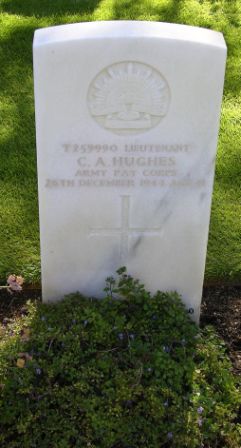|
 The
Mercury 20 April 1945 The
Mercury 20 April 1945
CORONER'S FINDING ON SOLDIER'S DEATH
The Coroner
(Col J. P. Clark) in returning a finding at the
inquest at
Hobart yesterday that Lt
Colin
Alexander
Hughes
(41) died from natural causes in an ambulance while being taken
to the 111th AGH Campbell Town on Dec. 26, 1944, said Capt
Leopold Winthrope, a medical officer was guilty of grave and
serious neglect of duty in failing to examine the patient
personally at the RAP, but that Capt Winthrope was not guiltv of
negligence to a criminal degree.
Lt
HUGHES
had been refused admittance to two Hobart hospitals, and the
inquiry was ordered by the Attorney-General (Mr McDonald).
"I am
informed that there is a cardiogram at the General Hospital at
Campbell Town, but not at Brighton, said the Coroner. Had there
been such a mechanical device, either at Hobart or at the
Brighton Camp Hospital, a correct diagnosis might have been
made, and the life of the deceased might at least have been
prolonged.
The hall
porter at the Royal Hobart Hospital took upon himself the
responsibility of refusing admission to the military patient
without even seeing him, and did not obtain the services of the
night sister on duty or a medical officer to examine the
patient. The practice at the hospital
is generally not to admit, soldiers into the out-patients
department, but where a case might appear desperate, the hall
porter would have kept in touch with the night sister or medical
Officér and either one or the other would have the right to
admit the patient immediately
into a ward.
"Dr J. B.
Muir's evidence is to the effect that the hall porter had no
discrétion.
He could not admit, but must call the proper authority, the
resident medical officer on duty. This the hall porter did not
do.
I feel
satisfied that the patient was wrongfully refused admission to
the Royal Hobart Hospital.
"When Capt
Winthrope was informed by the orderly at the RAP that the
patient was suffering from acute abdominal pain, to my mind this
should have put him on the alert, and it was his duty to attend
at the RAP and personally examine the patient. As I understand
the position, the first duty of a medical officer in his
examination of a patient is to obtain a detailed history of the
case. This assists the
medical man in his diagnosis.
Had Capt Winthrope personally attended
at the RAP, and questioned the patient, as it was his duty to
do,
I think he
would have found out from the patient that he had had previous
attention from Dr Ralph Whishaw, a heart specialist, in which
case he might have made a diagnosis of coronary disease, and
would have immediately given an order for the patient to be
admitted in to the Royal Hobart Hospital.
I think that
Capt Winthrope, as a medical officer, was guilty of a grave and
serious neglect of duty In failing to attend at the RAP, and
personally examine the patient, but I am not satisfied that
this officer showed such disregard for the life and safety of
Hughes
as to amount to a crime against the State. In other words, I do
not think that he can be said to be guilty of negligence in a
criminal degree.
"When
examined at Brighton by Capt Stegmann the patient informed him
that he had been subject to
pains in the
chest for some months, whenever he walked 200 or 300 yards, said
the Coroner. When Capt Stegmann examined the patient, he came to
the conclusion that
Hughes
was suffering from either biliary colic, ruptured peptic ulcer,
or coronary occlusion. He gave the deceased two injections of
morphia, and one of atropine. 1 should think this would obscure
the condition of the patient, rather than be helpful to his
condition. Capt Stegniann ordered the removal of the patient to
the Military General Hospital at Campbell Town.
We are all
satisfied now that the deceased was suffering from a coronary
disease, which caused his death, said the Coroner. .Had a
correct diagnosis of the patient's condition been made, either
at the RAP at Hobart or at the Brighton Camp Hospital, there was
only one treatment likely to benefit the patient, and that was
absolute rest. His removal in an ambulance for a distance of
over 60 miles would, I think, aggravate his condition.
One is at a
loss to understand why there is not a Military General Hospital
at or near where it would appear to be most required, said the
Coroner. It does not appear to me to benefit patients by having
to transport them from other portions of the State such, a long
distancé."
Evidence was
given yesterday by Dr Whishaw that he had been treating Lt
Hughes
from June to August 194 4 for a coronary disease of the heart.
When he last saw the patient, he considered his condition
hopeless. He was aided in his diagnosis by mechanical aids.
Dr Whishaw
said it was his opinion that Dr Winthrope's action in sending
the patient to Brighton was reasonable.
Replying to
Mr Baker (representing the RSL), he said the RAP orderly's
report of acute abdominal pain would indicate to him that thé
patient should be admitted to the nearest hospital
for observation. In the light
of his
present knowledge, this meant admittance to the Royal Hobart
Hospital.
Dr Camp-bell
Duncan, Government pathologist, said had the deceased informed
the RAP corporal of his treatment by Dr Whishaw a diagnosis'
would have been made easier. Even if the patient had been placed
in bed at the Royal Hobart Hospital, his recovery would have
been most unlikely, but there was a possibility. The patient
could not have lived longer than five years.
Dr Siegmann,
recalled, said a cardiograph at Brighton would have assisted him
in his diagnosis.
|

